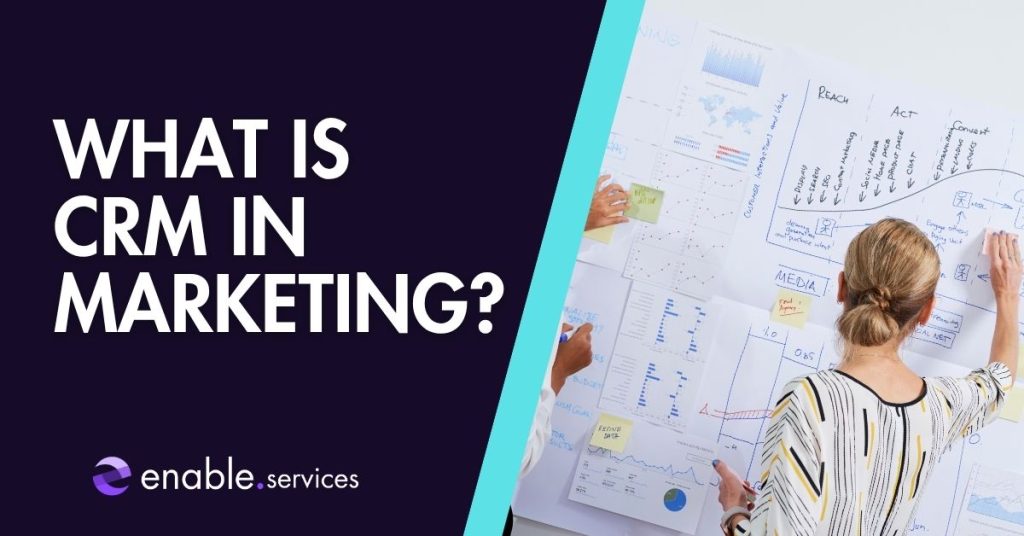What is CRM in marketing? Your questions answered

If you’re new to marketing or CRM, you might be wondering how the two are connected. Your company may already use a CRM platform, and as a marketer, it’s important to understand which functions you’ll need and how to use them effectively. In 2025, 82% of marketing professionals reported higher opening rates for personalised promotion emails creating through a CRM. While 97% of sales teams said that CRM system is important in closing deals. So, we know that CRM is essential in improving sales and marketing efforts, but how is CRM used in marketing and what is it?
As CRM consultants, we often find that marketing teams overlook the key features of their CRM systems or don’t receive efficient training to make the most out of the solution. That’s why we’re addressing the most common questions about CRM in marketing including why it’s important and how it’s used!
What does CRM stand for in marketing?
CRM stands for Customer Relationship Management. In the context of marketing, it refers to both the strategies and the software that businesses use to manage interactions with current and potential customers. The main goal of CRM is to improve business relationships by organising, automating, and synchronising sales, marketing, customer service, and support.
A CRM system stores customer data like contact information, purchase history, communication preferences, and engagement details, which helps marketing teams create more personalised and effective campaigns while also analysing important statistics like ROI and campaign performance.
Why is CRM important for marketing?
CRM plays an important role in marketing for several key reasons:
1. Personalised efforts
A good campaign never starts with the strategy “let’s send it to everyone on our system!”. As a marketer, you know how important it is to personalise your messaging and target the right audience. With detailed customer profiles on a CRM system, marketers can tailor messages to individual needs and behaviours, improving engagement and conversion rates.
2. Better segmentation
CRM helps segment customers based on demographics, buying patterns, or engagement levels, enabling more targeted marketing campaigns. With advanced reporting tools, marketers can create target lists and sync them with their email marketing platforms.
3. Improved customer retention
By tracking customer interactions and preferences, marketers can nurture relationships and boost loyalty.
4. Data-driven decisions
CRM tools provide insights and analytics that guide strategy, helping marketers measure campaign performance and ROI in order to effectively plan upcoming events and campaigns.
In short, CRM helps marketers better understand their audience, deliver relevant content, and build lasting relationships.
How is CRM used in marketing?

We know it’s important but how can it actually be used in your day-to-day campaigns and content? Here are some examples of how a marketing department uses CRM:
1. Email marketing
For us, this is the number one! Marketers can use CRM data to send personalised email campaigns based on user behaviour, interests, and purchase history.
For example, a B2B software company might run a CRM report to detect everyone in the Manufacturing industry, and send a personalised campaign to this group with custom messaging.
2. Lead nurturing
CRM tracks leads through the sales funnel and helps deliver the right content at each stage to aid in converting prospects into customers. Marketing can work with sales to send automated content to leads in the different stages including new customers, or leads in the nurturing phase.
When you connect your CRM to your marketing automation platform, you can set up lead scoring to trigger actions based on specific lead behaviours.
3. Campaign management
CRMs help plan, execute, and monitor marketing campaigns across multiple channels, ensuring consistent messaging. With tools like SugarCRM, campaigns can be used to measure ROI against sales opportunities to measure how well your campaigns performed.
4. Integrations to other marketing software
CRM tools often include or integrate with feedback systems, marketing automation tools, and social media channels, enabling you to track information across multiple platforms. When you work with enable.services, our development experts can build custom integrations tailored to your marketing needs.



